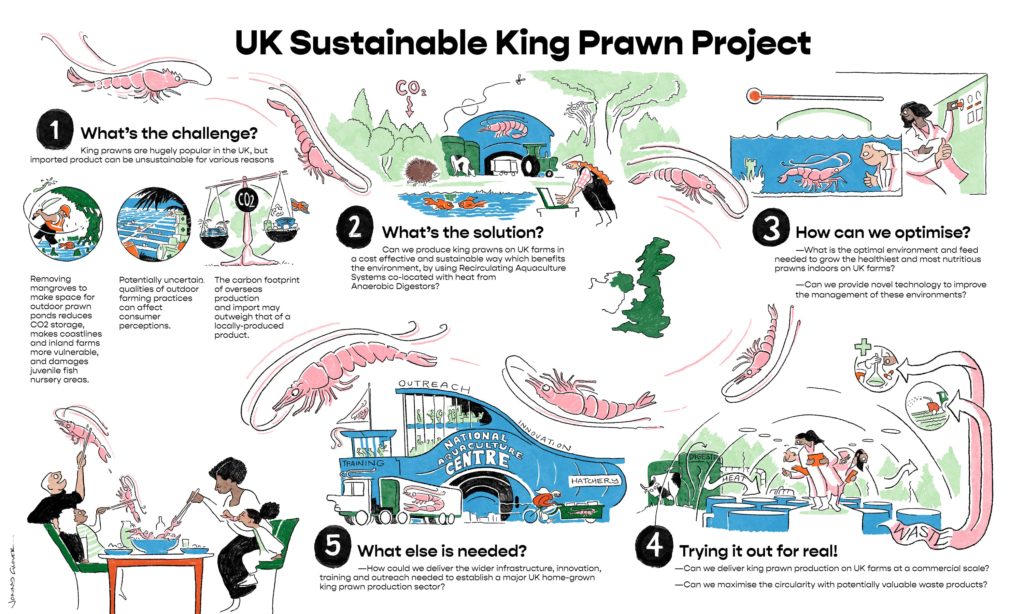The UK Sustainable King Prawn Project explored the potential to create a new, sustainable and more environmentally-friendly king prawn farming sector using renewable energy technology.
It aimed to help position the UK as a global frontrunner in this field and provide innovative diversification opportunities for UK aquaculture and agriculture.

The project ran from Sep 2022 to Mar 2026 and contained these elements:
The project had strong links with industry, including partnerships with aquaculture producers, Ixora Energy, Cargill, Sainsbury’s and Lyons Seafoods. It was funded by UK Research and Innovation (UKRI; £2 million between 2022-2026), as part of its Transforming UK Food Systems Strategic Priorities Fund.
Terrestrial farming is the greatest driver of biodiversity loss, a major contributor to greenhouse gas emissions and water pollution, and faces its most transformational reform in 50 years to improve both environmental and economic sustainability. The new Agriculture Act, 25YEP, has commitment to net zero carbon emissions and policies to enhance environmental stewardship, sustainability and support the production of public goods. This project aims to demonstrate the socio-economic benefit of a world-leading ‘terrestrial blue economy’, contributing multiple public goods to reform UK agriculture.
Combining high value king prawn aquaculture with farm-based renewable energy will provide a novel home-grown output with considerable but poorly understood economic and health potential. The public goods benefits of a switch from beef/sheep production to prawn include lower greenhouse gas emissions, water pollution, and land use, freeing land for other public goods such as trees, biodiversity, biodiversity net gain, and recreation. Furthermore, co-locating self-contained, indoor prawn production units with UK farm anaerobic digesters (AD) will maximise use of their (otherwise wasted) heat energy, enhancing sustainability and circularity of both industries. Extra income will also boost the farm-based renewable energy sector, helping the UK meet emissions targets.
Prawn is a healthy seafood with high protein, low calories, rich in vitamins, minerals, antioxidants and omega-3 fatty acids, promoting brain and heart health. Warm water king prawn is already highly popular seafood in the UK, with 22,852 tons (UK retail £319M) imported annually from Central America and SE Asia. However, traditional overseas production is vulnerable to climate/disease crises, has high transport-related CO2 emissions, and often uses environmentally unsustainable practices, e.g., destroying up to 80 % of nations’ mangrove forests which absorb and trap more CO2 than any other of Earth’s ecosystems. Mangroves also provide coastal protection against storms and coastal erosion. There is also the problem of illegal use (or just misuse) of chemicals such as pesticides and antibiotics resulting in contaminant residues in some of the prawn exported to the UK, EU and US that can cause health issues.
This project aims to completely avoid these problems and ensure a risk-free, healthier and sustainable supply chain of this heart- and brain- healthy seafood for UK-consumers, by facilitating a major expansion of UK’s king prawn RAS production sector which currently supplies equivalent to <1% of imports. We aim to co-locate RAS production with renewable energy sources on UK terrestrial farms. We conservatively estimate that if only 20% of the UK’s current Anaerobic Digestor (AD) plants were adapted for king prawn farming, we could sustain 960 prawn production units and harvest 5,520 tonnes of prawn per year (~25 % of current UK warm water prawn imports). With the rapid growth of AD plants across UK farms (10-fold increase since 2010), there is clear potential for truly sustainable, healthier, home-grown king prawn to provide the majority consumed in the near future, in addition to enhancing environmental stewardship, sustainability and supporting the production of public goods from UK agricultural practices. Importantly, this project will generate data to evaluate the true potential of sustainable UK king prawn production using renewable energy technology, as well as providing this industry with the necessary world-class scientific support.
The Aims and Objectives aligned with the 4 interconnected Work Packages (WP) as follows: